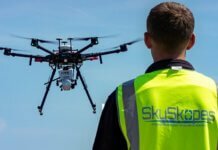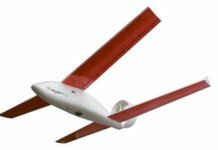The U.S. Senate’s commerce, science and transportation committee has approved S.2658, the Federal Aviation Administration (FAA) Reauthorization Act of 2016, which now includes several additional amendments related to unmanned aircraft systems (UAS).
The bill reauthorizes the FAA and related programs through the end of fiscal year 2017 (Sept. 30, 2017); the current FAA reauthorization expires at the end of the month. Chairman Sen. John Thune, R-S.D., and Ranking Member Sen. Bill Nelson, D-Fla., proposed the bill earlier this month, and it now heads to the full Senate floor for consideration.
The Small UAV Coalition, which says it is proud to endorse the legislation, explains that one amendment – co-sponsored by Sens. Dean Heller, R-Nev., and Maria Cantwell, D-Wash. – provides for a new class of air carriers and creates a necessary pathway for companies to leverage small UAS technology to deliver products to consumers. Specifically, the text of the amendment reads as follows:
“Not later than 2 years after the enactment of this section, the Secretary of Transportation shall issue a final rule authorizing the carriage of property by operators of small unmanned aircraft systems for compensation or hire within the United States.”
In addition, an amendment offered by Thune and Nelson, includes a provision that will enable broader UAS access to commercial mobile services and unlicensed spectrum – another vital component to safe and widespread integration of UAS, according to the coalition.
As introduced, the group says, the bill included several key provisions that represent major steps toward widespread UAS integration, including a provision to authorize the secretary of the U.S. Department of Transportation to grant exemptions for UAS operations beyond the visual line of sight and at night; a strong preemption provision – consistent with an FAA fact sheet released last year – to assert that a “patchwork quilt” of state and local UAS regulations could lead to a “fractionalized airspace”; and the establishment of a UAS traffic management (UTM) pilot program, representing an important step toward the implementation of UTM in low-altitude, uncontrolled airspace.
The coalition also strongly supports an amendment from Sen. Cory Booker, D-N.J., that establishes a micro UAS classification to provide for the commercial operations of drones weighing 4.4 lbs. and under. The House’s transportation and infrastructure committee adopted similar provisions when marking up its own FAA reauthorization legislation.
However, in a letter to Thune and Nelson, Drone as a Service company Measure says the 4.4-lb. classification “is an arbitrary weight based on convenience, not evidence.”
“Currently, the only weight threshold supported by actual data is 250 grams, the standard established by the UAS registration task force as the threshold weight for drone registration. This is the only standard that has been supported by experimental data and physics-based calculations, and until compelling, factual and data-based arguments exist for other weight thresholds, Measure opposes drafting regulations for drones based upon weight.”
Additionally, UAS privacy amendments from Sen. Ed Markey, D-Mass., were adopted by the committee.
One amendment would enhance the commercial and government drone database established by the bill by requiring that operators disclose if they collect personally identifiable information about an individual, including through the use of facial recognition; how the personal data will be used, including for advertising or marketing purposes; and when the information will be destroyed.
Other amendments would ensure that this database is easily searchable and prominently displayed on the FAA website; ensure that the database is publicly available through Sept. 30, 2017; allow U.S. citizens to determine the location, purpose of flight and technical capabilities – such as cameras or license plate readers – of government drones; require privacy research at the UAS test sites; and improve the data minimization requirements in the bill.
“As more and more drones take flight in our skies, the need to protect Americans’ privacy is paramount,” states Markey, who recently testified at a Senate hearing. “I am pleased that we are taking important steps in this bill to enact 21st-century rules of the sky, including promoting transparency of drone operations.”
The Small UAV Coalition is encouraging Congress to enact the FAA reauthorization legislation into law in the near term so as to not allow the country to fall behind global competitors in the UAS space.
In a statement, Brian Wynne, president and CEO of the Association for Unmanned Vehicle Systems International, says, “[The] passage of an FAA reauthorization measure by the Senate Commerce Committee is an important milestone for accelerating the civil and commercial use of unmanned aircraft systems, as well as expanding collaborative research and operations. We look forward to continuing to work with the Senate as the FAA reauthorization moves through the legislative process.”
The full list of amendments can be found here.








